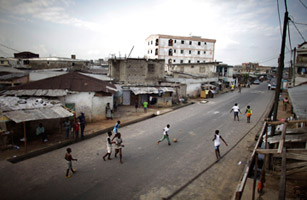
Children play football on the streets in Douala, Cameroon May 22, 2010.
Italy, the reigning world champion by dint of its victory in the 2006 World Cup, takes soccer deadly seriously. The nation abounds with legendary clubs owned by extravagantly rich magnates who have spent the last 50 years luring the world's finest players with offers they cannot refuse. So where is today's highest-paid player in Italy from? Not from Brazil or Argentina, the planet's most prolific footballing factories; nor from France, Germany or Spain. Neither, for that matter, is he Italian. The player with the highest salary in Italy is a Cameroonian called Samuel Eto'o, the spearhead of an African contingent that has taken Europe's soccer citadel by storm.
Unlike many in the money-mad soccer world, or in banking, Eto'o has earned every penny. Three times African player of the year, Eto'o goes into the first World Cup on African soil as captain, and uncrowned king, of Cameroon, armed with a statistic that he alone owns: Eto'o is the first player ever to have won the treble of National League, National Cup and European Champions League — soccer's royal flush — with two different teams. And he has done it (the odds have to be mightily long on this happening again anytime soon) in successive seasons, the first with Barcelona and the second, in May, with Inter Milan.
Now Eto'o will get a chance to perform on the biggest stage the world has ever seen. Soccer is the great secular religion. Some 30% of the world's people declare themselves Christian; 20%, Muslim. But people's devotion to soccer transcends all creeds, races, tongues. The World Cup in South Africa will generate more intense planetary babble — will be dissected, tweeted, Facebooked, Googled, SMSed and scrutinized by billions on 400 TV channels in 208 countries — than any other event in human history. The 2006 World Cup in Germany had a total cumulative TV audience of more than 26 billion, according to official FIFA figures. The big-smiling, boyish Eto'o, whose country brought African soccer to the world's attention when it reached the quarterfinals of the 1990 Cup, will loom large in the conversation. How he got there — how he managed his ascent to the pantheon of humanity's most popular divinities alongside other African players such as Didier Drogba of Ivory Coast and Michael Essien of Ghana — is an unbeatable tale of rags to riches. It's little wonder that during the hour we spoke recently, Eto'o used the word dream 14 times. As in, "My whole life is a dream, a dream come true, a dream I'll only wake up from the day I stop playing football."
The Game You Can Play Anywhere
How did the World Cup become the species' favorite pastime? Why do more people spend more time watching or playing soccer than they do engaging in any other social activity, with the possible exception of eating and drinking? Why are those who play it best venerated for their skill and adopted as warriors, or armies, in tribal causes — be they national or local? Here's one reason: the game is just so accessible. You can play anywhere: on grass; on cement; on dusty, stony ground; or even (as pained mothers the world over will attest) inside the house. The basic rules are simple, and you don't need any kit or equipment beyond a round — or even roundish — object of not necessarily fixed size. It can come manufactured (a tennis ball often does the job) or may be fashioned out of animal bladders, stones, socks or plastic bags.
Soccer is uniquely democratic among team sports. It doesn't matter whether you are tall or short, whether you are a skinny African kid or a large Dutchman, whether you are black or white or brown. Take a look at any successful team: short of the conspicuously overweight, everybody gets a look in. The best player in the world, Argentina's Lionel Messi, is barely 5 ft. 7 in. (174 cm), and he made it to that height only after jabbing himself daily in the thigh with growth-hormone medication during his early adolescence.
"If there is a god in soccer today, it is Messi," says Eto'o, who played alongside the Argentine star at Barcelona and, like him, offers convincing proof of the game's democratic accessibility. We spoke at the garden of the Bulgari Hotel, a black-and-white marble construction set in a stately precinct of Milan, where a suite of the type in which he has lived for most of the past year costs more for one night than the average annual income in Cameroon. Eto'o, 29, was raised in the seaside city of Douala, where he lived with his parents and five brothers and sisters in what he describes as "very, very humble" conditions. Although, he is quick to say, many neighbors had it worse. "I went to primary school, and while we couldn't choose our food, we did eat." The cramped home, where the children slept several to a bed, had one enviable mark of distinction: "The rainwater did not come in through the ceiling."